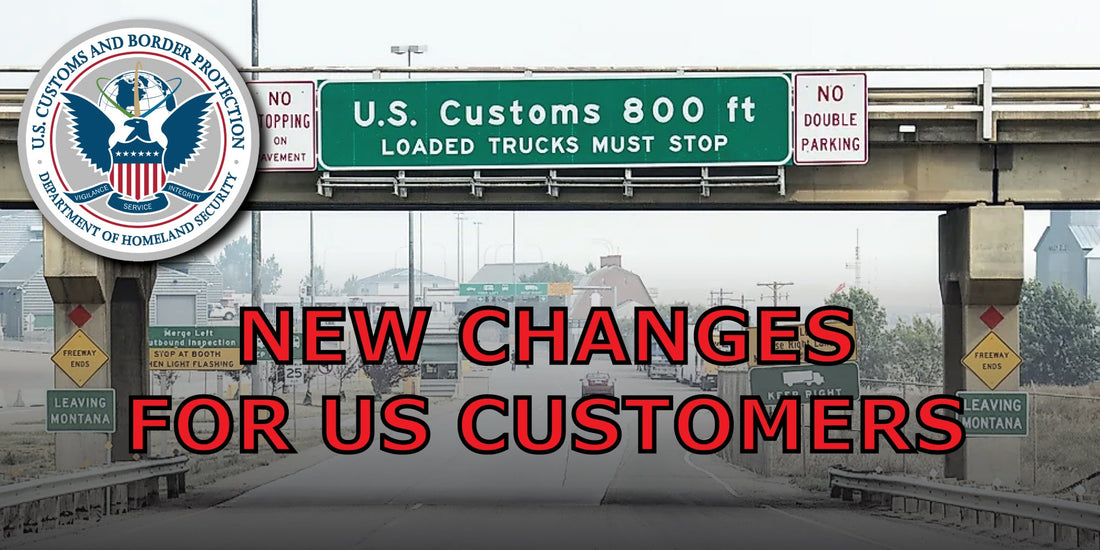
(USA Customers) Changes to imports - Tariffs, Duties, Brokerage Fees - Effective August 29, 2025
Share
As many of you guys are now aware, the Trump executive orders that were announced months ago have offically kicked in as of August 29, 2025. This is the end of the $800 de minimis threshold for USA customers.
Orders under $800 in declared value will no longer be duty-free when shipping into the USA. Over the past 6 weeks, we have seen an increase of rejected parcels by US customs (tracking usually showed no one at address despite it never being transferred to the courier in the US). This was caused by confusion by US customs employees over who was responsible for tariffs and duties on packages, even though it wasn't even August 29 yet. So certain US employees who worked at customs were just rejected the packages.
Well, we have an answer. Buyers are required to pre-pay any and all duties, tariffs, and brokerage fees before the package arrives to US customs or it will get auto-rejected. Everything must be sent to the US now by DDP.
Emails were sent to all United States buyers who placed an order between June 1-August 20 for rounds 26 & 27 to clarify.
What are Tariffs?
Tariffs are government-imposed taxes on certain imported goods. They are designed to control trade between countries and can vary depending on the product type, the material it’s made from, and its country of origin. Tariffs are collected at the border before the goods can enter the country. Tariffs are usually based on a % per category.
What are Duties?
Duties are fees charged by the government when you import goods into your country. The amount depends on factors like the product category, its declared value, and where it was manufactured. Duties are separate from shipping charges and must be paid before your package is released from customs. Duties are what the % of tariffs add up to.
What are Brokerage Fees?
Brokerage fees are service charges from the courier or customs broker for processing your shipment through customs. This includes preparing paperwork, calculating taxes/duties, and ensuring your package is cleared for delivery. These fees are usually passed onto the brokerage.
How are duties calculated for eCommerce sales?
Duties are based on the total sales price of the order (minus shipping), if the order is $105 + $12 shipping, then the declared value for US customs is $105.
What is DDP and DDU?
DDP is Delivered Duties Paid, it's a shipping term used to describe a package shipped that has the duties already pre-paid when it arrives to the buyers countries customs. This is currently the requirement now as of August 29th.
DDU is Delivered Duties Unpaid, it's the term for when a package goes through a countries customs that hasn't been paid any duties on yet. Typically then the buyer would pay at their door upon receiving the package, or they would need to call and pay over the phone, or they would get invoiced for it later. This used to be the standard.
Who is responsible for ultimately paying the duties?
Buyers are always responsible, this is the golden standard no matter what country a buyer is from. Typically sellers would not know the policies, regulations of hundreds of countries around the world that they may offer shipping to, only a buyer would know their own countries rules and regulations. 99.9% of all websites/eCommerce stores, including eBay, Amazon, Etsy, have it as the default that buyers are responsible for this.
What is Section 301?
Section 301 of the U.S. Trade Act of 1974 allows the U.S. Trade Representative (USTR) to impose tariffs or other trade restrictions when another country engages in unfair trade practices. These tariffs are on top of normal import duties.
Example: If vinyl fabric from China has a 4.2% base duty, and it’s on a Section 301 list at 25%, the total duty is 4.2% + 25% = 29.2%.
- List 1: 25% additional tariff on $34 billion of imports, effective July 19, 2018
- List 2: 25% additional tariff on $16 billion of imports, effective August 23, 2018
- List 3: 25% additional tariff on $200 billion of imports (increased from 10%), effective May 10, 2019
- List 4A: 7.5% additional tariff on $120 billion of imports, effective February 14, 2020 (there is no additional tariff on goods on list 4B)
-
Four-Year Review: additional tariffs ranging from 25% - 100% effective September 27, 2024, January 1, 2025, and January 1, 2026, variously.
On August 29, 2025, USTR further extended certain exclusions from the China Section 301 tariffs through November 29, 2025. These exclusions had previously been extended through through August 31, 2025. Products that will continue to be excluded from the tariffs under this action include (1) those listed in Annex C to this notice and (2) the solar manufacturing equipment listed in Annex B to this notice. These exclusions are available for any product that meets the specified HTSUS numbers and product descriptions, regardless of whether the importer filed an exclusion request.
As of August 29, 2025, the current Section 301 tariffs on our items (List 3) is 25%.
What is Section 321?
Section 321 was the US regulation that allowed goods valued at $800 or less per shipment to enter the U.S. duty-free and without formal entry. This is what was officially removed as of August 29, 2015.
What are IEEPA?
The International Emergency Economic Powers Act (IEEPA) is a U.S. law that gives the President power to regulate trade and financial transactions during a declared national emergency.
It’s often used for sanctions and export/import restrictions against certain countries, entities, or products.
Fentanyl-Related Tariff (EO 14195) - as of right now this is 20%
Reciprocal (Baseline) Tariff (EO 14256) - as of right now this is 10%
What is CUSMA-Compliant items?
CUSMA = Canada–United States–Mexico Agreement (the updated NAFTA). If an item meets CUSMA origin rules (meaning it was made in the U.S., Canada, or Mexico, with sufficient regional content), it can enter duty-free.
For vinyl and basically all of our fabric since it's made in China, CUSMA doesn’t apply—even if shipped from Canada. So the majority of our items don't get any reduction in duties. We use China as the origin.
What are HTSUS?
Harmonized Tariff Schedule of the United States. This is a 10 digit code that is assigned to every type of item. The items we sell all match a specific 10 digit HS code, this HS code is what we declare to US customs on the import forms and it's how they determine what tariff % is assigned to each HS category to figure out the duties owed.
What are the total in Tariffs that a US buyer can expect?
The majority of our items get tariffed on Section 301-list 3 at 25%, plus IEEPA of Fentanyl-Related Tariff (EO 14195) for 20% plus Reciprocal (Baseline) Tariff (EO 14256) of 10% making it a total of 55% on average. Certain types of items are much higher, as high as 80% to 120% If we take 55% for example, if the order is $100, then the buyer might have to pay an additional $55 in duties/tariffs + brokerage fees.
How can you make it cheaper?
There are legal loopholes to making these tariffs cheaper for US customers, one of which is utilizing the US Customs rule for First Sale Doctrine. This lets importers base the customs value of goods on the first sale price in a multi-tiered transaction — rather than the final resale price paid by the end buyer. Using the first sale price can reduce duties and tariffs because they’re calculated on a lower declared value.
You have a new US warehouse?
We do, we are working with ZiggDig Inc - an international distribution and fulfillment company who will be handling our US customers orders moving forward. Our products (especially each pre-order round) will be sent to their Arizona, USA location for processing, from there they will do sorting, counting, and shipping to our US buyers. This is going to make duties and tariffs really inexpensive, possibly even zero for certain customers.
Where is the best place to keep updated on what is happening for US imports?
The best place is your local news and government websites, everything listed here is just a compilation of what Trump has been saying, doing and signing executive orders for over the past year.

1 comment
Please email me regarding my preorder from round 26 or 27?? I have never done a preorder till July 29. I don’t think I ever will again!!